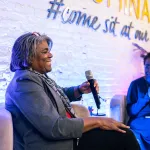A generation after Hillary Clinton declared on an international stage that “women’s rights are human rights,” Vice President Kamala Harris will address a United Nations women’s forum on gender equity in a live speech next week, placing her in the global spotlight in the midst of a pandemic that has had a disproportionate impact on women in the United States and abroad.
Harris will lead the U.S. virtual delegation to the Generation Equality Forum in Paris, which runs June 30 through July 2. She will provide live opening remarks alongside co-hosts French President Emmanuel Macron, Mexican President Andrés Manuel López Obrador and U.N. Secretary General António Guterres. The event also marks the 25th anniversary of the United Nations Fourth World Conference on Women in Beijing.
As the most powerful woman in American politics and the first woman and woman of color to serve as vice president, Wednesday’s speech could give Harris her highest-profile platform yet to speak directly to issues impacting women around the world. Addressing world leaders, activists, international organizations and media, her remarks have the potential to resonate across the ages and boost her star power as she looks to her political future.
Administration officials told The 19th they expect her speech to hit upon broad themes and stress global cooperation.
Harris will reflect on “how interconnected our world is today and that gender inequality knows no bounds.”
“She will argue that to achieve gender equality will require a global effort — and the involvement of governments, civil society, and the private sector working together,” administration officials said. Harris also will announce U.S. commitments to address gender-based violence, economic justice, and sexual and reproductive rights, according to her office, which did not provide specifics.
It was at the Beijing conference in 1995 that Clinton delivered a speech, focused on women and young girls that has had a lasting impact around the world.
“I believe that now on the eve of a new millennium it is time to break the silence,” said the then-first lady of the United States. “It is time for us to say, here in Beijing and for the world to hear, that it is no longer acceptable to discuss women’s rights as separate from human rights.”
Clinton was cheered and applauded by many women in the audience as she condemned domestic violence, genital mutilation and forced sterilization.
“If there is one message that echoes forth from this conference, let it be that human rights are women’s rights and women’s rights are human rights once and for all,” Clinton thundered.
Harris could have a similar moment next week. Women, the majority of the global population, are grappling with longstanding inequity, and a rise in domestic violence and devastating education and economic harm exacerbated by the COVID-19 crisis, making them less free and less safe in democracies around the world.
Many of Harris’ public stances and remarks since taking office have centered on women and girls. In the pandemic, she has focused on issues including caregiving and caregivers, the pay gap and pregnancy-related morbidity.
The speech is also an opportunity for a reset after Harris drew criticism for her remarks during her first trip abroad as vice president. In Guatemala earlier this month at her first solo press conference, Harris urged migrants from the region, “Do not come,” angering U.S. immigration activists and organizers and progressive lawmakers who condemned her comments as insensitive. And in an interview with NBC journalist Lester Holt, Harris had an awkward moment as she dismissed questions about why she had not yet traveled to the U.S.-Mexico border and when such a trip would be in her plans. She told Holt she “hasn’t been to Europe yet, either.”






